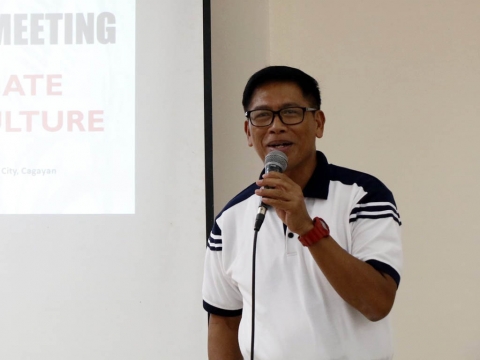Former national corn program director Lorenzo Caranguian promotes cassava as a food security crop.
DILIMAN, Quezon City—Because of its ability to thrive even in the most unfavorable conditions, cassava is now seen not only as a major staple food but also as a food security crop.
This is one of the highlights of the teleradyo interview with former national corn program director and now full-time farmer, Lorenzo Caranguian. The interview aired July 10 on “Agri Asenso”, the Agricultural Training Institute’s (ATI) program on DZRH.
According to Caranguian, cassava can tolerate prolonged drought and typhoons. It can grow even in the worst kind of soil and is resistant to pest and diseases unlike other crops such as rice and corn.
“This is an all-year-round crop that can be harvested any time of the year. It can grow again through ratooning where you leave the stem when harvesting so that it can still produce tillers,” he said.
Cassava is very suitable for intercropping or diversified farming, he added. Other crops that can be planted with it are vegetables like okra, chili, and eggplant, as well as fruit trees like mangoes and sweet guyabano.
Caranguian owns Caranguian Integrated Farm in Iguig, Cagayan, which is an ATI-certified Learning Site for Agriculture. About one hectare of his farm land is dedicated to cassava production.
“In our farm, we plant two to three cassava cuttings per hole. So in each hole, we can harvest 20 to 30 kilos of tubers. Right now, we have about 10,000 holes, so if we sell 300,000 kilos of cassava for Php10 per kilo, we can earn about Php3 million,” he shared.
Caranguian’s farm has supplied cassava to one of the largest corporations in the country, aside from catering to local orders from village level producers of cassava cake, pichi-pichi, and other snacks. Aside from food and food products, cassava is also used to produce animal feeds, alcohol, bioethanol, medicine, glue, and other materials.
Caranguian shared that they are set to receive accreditation as a Farm Tourism Site and cassava production will be incorporated as part of the tourism activities in the farm. Training and learning activities on cassava and other crops such as rice may also be availed from them.
“In our farm, we give emphasis to training and education for farmers. [Because we know] that money is nothing if you do not know how to use it properly,” he said.

